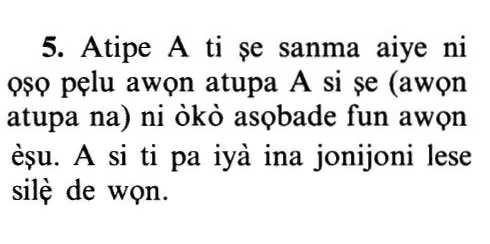67vs5
Select any filter and click on Go! to see results
وَلَقَدْ زَيَّنَّا السَّمَاء الدُّنْيَا بِمَصَابِيحَ وَجَعَلْنَاهَا رُجُوماً لِّلشَّيَاطِينِ وَأَعْتَدْنَا لَهُمْ عَذَابَ السَّعِيرِ
Walaqad zayyanna alssamaa alddunya bimasabeeha wajaAAalnaha rujooman lilshshayateeni waaAAtadna lahum AAathaba alssaAAeeri
Index Terms
Click to play
Yoruba Translation

Hausa Translation
Kuma lalle Mun ƙawãta samar farko da fitillu, kuma Muka sanya su abin jifa ga shaiɗanu, kuma Muka yi musu tattalin azãbar Sa´ĩr.
Asbabu n-Nuzuul (Occasions of Revelation)
He says,
وَلَقَدْ زَيَّنَّا السَّمَاء الدُّنْيَا بِمَصَابِيحَ ...
And indeed We have adorned the nearest heaven with lamps,
This refers to the stars which have been placed in the heavens, some moving and some stationary.
In Allah's statement,
... وَجَعَلْنَاهَا رُجُومًا لِّلشَّيَاطِينِ ...
and We have made them (as) missiles to drive away the Shayatin,
The pronoun `them' in His statement, "and We have made them'' is the same type of statement as the stars being referred to as lamps. This does not mean that they are actually missiles, because the stars in the sky are not thrown. Rather, it is the meteors beneath them that are thrown and they are taken from the stars. And Allah knows best.
Concerning Allah's statement,
... وَأَعْتَدْنَا لَهُمْ عَذَابَ السَّعِيرِ ﴿٥﴾
and We have prepared for them the torment of the blazing Fire.
means, `We have made this disgrace for the devils in this life and We have prepared for them the torment of the blazing Fire in the Hereafter.'
This is as Allah said in the beginning of Surah As-Saffat,
إِنَّا زَيَّنَّا السَّمَآءَ الدُّنْيَا بِزِينَةٍ الْكَوَكِبِ
وَحِفْظاً مِّن كُلِّ شَيْطَـنٍ مَّارِدٍ
لاَّ يَسَّمَّعُونَ إِلَى الْمَلإِ الاٌّعْلَى وَيُقْذَفُونَ مِن كُلِّ جَانِبٍ
دُحُوراً وَلَهُمْ عَذابٌ وَاصِبٌ
إِلاَّ مَنْ خَطِفَ الْخَطْفَةَ فَأَتْبَعَهُ شِهَابٌ ثَاقِبٌ
Verily, We have adorned the near heaven with the stars (for beauty). And to guard against every rebellious devil. They cannot listen to the higher group (angels) for they are pelted from every side. Outcast, and theirs is a constant (or painful) torment. Except such as snatch away something by stealing, and they are pursued by a flaming fire of piercing brightness. (37:6-10)
Qatadah said,
"These stars were only created for three purposes:
- Allah created them as adornment for the heaven (sky),
- as missiles for the devils and
- as signs for navigation.
Therefore, whoever seeks to interpret any other meanings for them other than these, then verily he has spoken with his own opinion, he has lost his portion and burdened himself with that which he has no knowledge of.''
Ibn Jarir and Ibn Abi Hatim both recorded this statement.
ولما نفى عنها في خلقها النقص بين كمالها وزينتها فقال " ولقد زينا السماء الدنيا بمصابيح " وهي الكواكب التي وضعت فيها من السيارات والثوابت وقوله تعالى " وجعلناها رجوما للشياطين " عاد الضمير في قوله وجعلناها على جنس المصابيح لا على عينها لأنه لا يرمي بالكواكب التي في السماء بل بشهب من دونها وقد تكون مستمدة منها والله أعلم وقوله تعالى " وأعتدنا لهم عذاب السعير" أي جعلنا للشياطين هذا الخزي في الدنيا وأعتدنا لهم عذاب السعير في الأخرى كما قال تعالى في أول الصافات " إنا زينا السماء الدنيا بزينة الكواكب وحفظا من كل شيطان مارد لا يسمعون إلى الملأ الأعلى ويقذفون من كل جانب دحورا ولهم عذاب واصب إلا من خطف الخطفة فأتبعه شهاب ثاقب " قال قتادة إنما خلقت هذه النجوم لثلاث خصال خلقها الله زينة للسماء ورجوما للشياطين وعلامات يهتدى بها فمن تأول فيها غير ذلك فقد قال برأيه وأخطأ حظه وأضاع نصيبه وتكلف ما لا علم له به رواه ابن جرير وابن أبي حاتم .
"ولقد زينا السماء الدنيا" القربى إلى الأرض "بمصابيح" بنجوم "وجعلناها رجوما" مراجم "للشياطين" إذا استرقوا السمع بأن ينفصل شهاب عن الكوكب كالقبس يؤخذ من النار فيقتل الجني أو يخبله لا أن الكوكب يزول عن مكانه "وأعتدنا لهم عذاب السعير" النار الموقدة
جمع مصباح وهو السراج . وتسمى الكواكب مصابيح لإضاءتها .
I'raab - grammatical analysis of the Qur'an
«وَلَقَدْ زَيَّنَّا السَّماءَ» الواو واو القسم واللام واقعة في جواب القسم المحذوف «قد» حرف تحقيق وماض وفاعله ومفعوله «الدُّنْيا» صفة «بِمَصابِيحَ» متعلقان بزيّنا والجملة جواب القسم لا محل لها «وَجَعَلْناها» ماض وفاعله ومفعوله الأول «رُجُوماً» مفعوله الثاني «لِلشَّياطِينِ» متعلقان برجوما
و الجملة معطوفة على ما قبلها. «وَأَعْتَدْنا» ماض وفاعله والجملة معطوفة على جملة زيّنا لا محل لها «لَهُمْ» متعلقان بالفعل «عَذابَ» مفعول به مضاف إلى «السَّعِيرِ» مضاف إليه.
